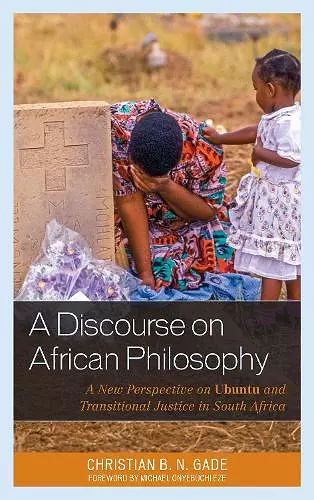A Discourse on African Philosophy
A New Perspective on Ubuntu and Transitional Justice in South Africa
Format:Hardback
Publisher:Lexington Books
Published:18th Apr '17
Currently unavailable, and unfortunately no date known when it will be back
This hardback is available in another edition too:
- Paperback£35.00(9781498512275)

Many have argued that ubuntu was a formative influence on the post-apartheid Truth and Reconciliation Commission (TRC), South Africa’s famous transitional justice mechanism. A Discourse on African Philosophy: A New Perspective on Ubuntu and Transitional Justice in South Africa challenges and contextualizes this view in a way that not only provides new findings and reflections on ubuntu and the TRC, but also contributes to the field of African philosophy. One of Christian B. N. Gade’s key findings, founded on qualitative interviews in South Africa, is that some former TRC commissioners and committee members question the importance of ubuntu in the TRC process. Another is that there are several differing and historically developing interpretations of ubuntu, some of which have evident political implications and reflect non-factual and creative uses of history. Thus ubuntu is not a shared cultural heritage, in the ethnophilosophical sense of a static property characterizing a group. In fact, throughout this book Gade argues that the ethnophilosophical approach to African philosophy as a static group property is highly problematic. Gade’s research presents an alternative collective discourse on African philosophy (“collective” in the sense that it does not focus on any single individual in particular) that takes differences, historical developments, and social contexts seriously. This book will be of interest to scholars in African philosophy, transitional justice, politics and cultural heritage, and law in South Africa.
In this book, Christian B. N. Gade refreshingly approaches the African philosophy of ubuntu neither as an ethnophilosophy, describing a single worldview purportedly held by all sub- Saharan peoples, nor as a moral philosophy, prescribing a single ethic they all should hold. Instead, he approaches it as an intellectual historian who is true to particularities. Resourcefully drawing on novel sources such as interviews and neglected documents, Gade reveals a variety of competing interpretations of ubuntu and plausibly argues for ways they have influenced South African politics in the post-apartheid era. -- Thaddeus Metz, University of Johannesburg
ISBN: 9781498512251
Dimensions: 239mm x 158mm x 14mm
Weight: 318g
120 pages